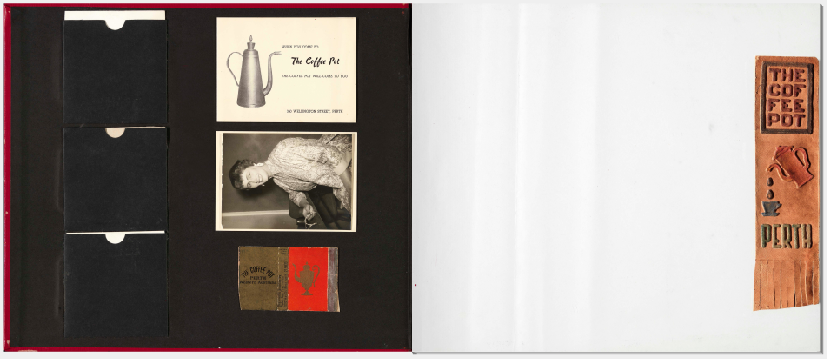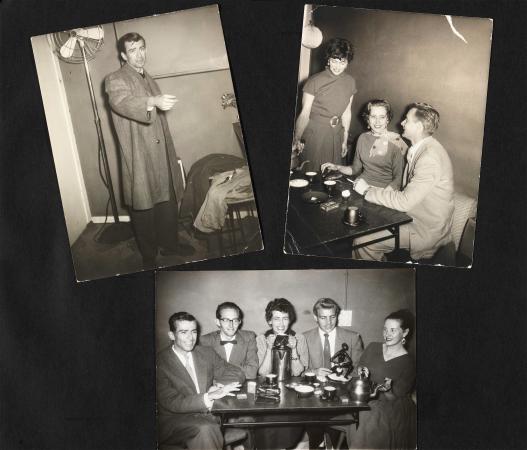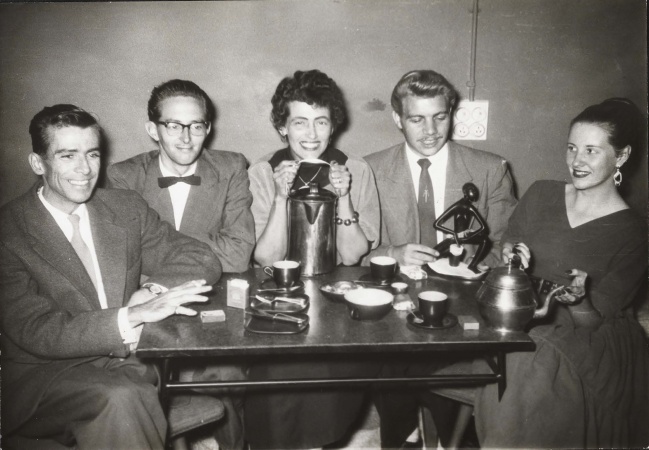On 19 May 2020, Dr Kate discussed a more recent piece of Western Australian social history: a scrapbook containing mementos of a Perth café that was around from the 1950s to the early 1980s. The Coffee Pot was a popular hangout for many, offering style, sophistication, and a welcoming atmosphere.
The scrapbook was compiled by owner, Prada van der Nagel, who set up and managed the café with her husband, Rob. It includes photographs, newspaper clippings, and advertisements for the café. It was lent to the State Library for digital reproduction by the van der Nagel’s daughter after it was displayed in an exhibition in 2015.
The scrapbook is available digitally through the State Library catalogue.
Recorded live on ABC Radio Perth on 19 May 2020.
Transcript
BEGINNING OF INTERVIEW
Jess: While they’ve been closed or doing just takeaway only over the past couple of months, I think it’s pretty clear that our local cafes are really the hubs of our local communities, aren’t they? They’re the cosy places. They’re like a home away from home, you see those familiar faces, you fight to get your coffee amongst all those people wearing lycra and who have been out exercising. Well we’ve been missing them, haven’t we? We’ve been missing this experience and so some of those cafes re-opened yesterday and people were pretty excited to be the first ones through the door because we love a good cafe and we’ve got plenty of them. We’ve got fantastic ones all around Perth and I wondered, have you ever wondered, when our love of the cafe culture began here in Western Australia?
Well, Dr Kate Gregory is the Battye Historian at the State Library of Western Australia and she’s here to tell us about a little place called ‘The Coffee Pot’. It was a late night cafe opened by Dutch immigrants in the 1950s, which had a huge impact on Perth’s cafe scene.
Hello Dr Kate.
KG: Hello Jess, how are you?
Jess: I’m well thanks and a big week for you at the Library with you opening your doors again to the public.
KG: Indeed, indeed, it’s very exciting. Yes, everyone is very excited to welcome people back into the Library.
Jess: Now why was The Coffee Pot so significant to Perth?
KG: Yes, look this is, this little scrapbook that we have, that was actually put together by the owner of The Coffee Pot, and so it was owned by a couple called Prada and Rob van der Nagel and we have this scrapbook which is actually a digital object, which I can talk a little bit more about it; it really interesting new avenue for the State Library to be able to collect materials.
This is a little piece of Perth’s social history and as you said, the cafe culture that we have now really started to emerge, in its infancy, in the post war period in the fifties in Perth and there was a real culture around what were called coffee lounges. They weren’t really known as cafes then. They were coffee lounges and it was an era of kind of a late night culture in the fifties and sixties. These cafes were open really late to sort of 2am or 3am on the weekends (laughs) and they served coffee, they were a place of culture, of conversation, there was often music and in this particular example, The Coffee Pot, it was... you used the word cosy in your intro and that was very apt. It had a real cosiness. It was tiny. It was a little tiny coffee lounge and it had a devoted regular clientele and they were often people who were associated with the arts and theatre industries. They were students, they were teacher trainers and nurses in training as well and who had accommodation actually close by.
Jess: We will get Dr Kate back to continue her chat about The Coffee Pot, which is a little place and it was opened by Dutch migrants in 1950s and as Kate was explaining, it had a huge impact on Perth’s cafe scene and as soon as we can we’ll get her back on the line. It was just a bit of a bad line there for all of you but I wondered if you had any memories of this place. Someone saying here, “Oh my God, I loved The Coffee Pot’s spring rolls”. Thanks very much for that.
A couple of other people texting in as well about the Key Cup Ban that we had in place before. Thank you for those as well.
Now, I think I am told we’ve got Dr Kate back in. Hopefully the lines are a little better.
Hello Dr Kate.
KG: Hi Jess, I’m back again. Hopefully it’s better (laughs).
Jess: (Laughs) Much better. I think my ears are still ringing from that last chat.
Now, you were just explaining to us about the sort of cute nature, the cosy nature of The Coffee Pot. Can you tell us a little about the owners beside the fact that we know they were Dutch migrants? What were they like?
KG: Yes, so Prada and Rob van der Nagel were their names and they had migrated to Perth from Holland in the very late forties and they were both very cultured people and quite sophisticated and I think that they really brought an element of European culture with them when they came to Western Australia (giggles).
Jess: Lovely and I’m sure we needed that (giggles).
KG: And that’s right and so they introduced... they decided to set up this late-night coffee lounge and they had this lovely motto that they used for The Coffee Pot. It was ‘When you come to The Coffee Pot, the coffee pot will come to you’.
Jess: Awww, isn’t that lovely.
KG: And this scrapbook that we have has lots of ephemera that they had associated with The Coffee Pot, so things like the licence agreement, the lease agreement, little photographs and art work, little drawings. Prada and Rob were very much supporters of the local WA art scene. So for instance, they exhibited the work through Skinner Galleries of some very now famous WA artists but at that time they weren’t so for people like Guy Grey-Smith and Brian McKay, they actually had their artwork on display in The Coffee Pot. So, that it was a real hub of the early Perth kind of intelligentsia and arts scene.
Jess: So, given they were so closely linked to the art scene, presumably they were located in the centre of Perth, do you know specifically?
KG: They were yes, they were 305 Wellington Street and they eventually... they were there for about 25 years and eventually they needed to move because Wellington Street was being widened in the late seventies.
Jess: I think that’s the most changed road in Western Australia’s history isn’t it? It seems forever to be going, undergoing road works.(laughs)
KG: (Laughs) Yes, so they then moved to Subiaco and in Rokeby Road and The Coffee Pot went on for another decade or so after that. So yes, so really... and this scrapbook that we have is a digital object. So, that means that we have the digital copy that we will preserve for the future and the original is in private hands; actually with the daughter of Prada and Rob and it’s a beautiful, beautiful object. It’s a beautiful red scrapbook that’s got lots of photographs, pieces of ephemera, postcards and you can really get a sense of the cultural importance of The Coffee Pot for people in Perth at that time.
Jess: And again Dr Kate, if people want to have a look at this, as you said it’s digital, they can go onto the Library website, still stuff or all stuff, even though you have opened doors to the public again?
KG: Yes, absolutely that’s right. So, please go have a look on the State Library website. You can click on the WA, the ABC icon and that will link through and you can click on to the digital object, to this Coffee Pot scrapbook and have a look through and yes, be inspired. It’s lovely.
Jess: Just quickly, before we are hard up against the news, but just quickly Dr Kate, what does a place like this tell us about the impact of how post war migration shaped Perth? Pretty influential?
KG: Absolutely. So, we know that really the European migration really contributed to the social and cultural diversification of Perth. There was a massive change and it... I think really a lot of these European migrants in particular really did help shape the new cafe culture and new kind of city, growth of the Perth city as a place of sort of vibrancy and... yeah.
Jess: Yes, it’s fantastic.
Dr Kate, as always thank you very much for your time.
Sorry, I had to cut Dr Kate Gregory short there just to bring you a traffic update before the news and that was Kate Gregory there from the State Library of Western Australia.
END OF INTERVIEW


